
Mario Monti is an Italian economist and academic who served as the Prime Minister of Italy from 2011 to 2013,leading a technocratic government in the wake of the Italian debt crisis.

Bocconi University or UniversitàBocconi is a private university in Milan,Italy. The university provides education in the fields of economics,finance,law,business administration,management,political science,public administration,information science,data science,and computer science. UniversitàBocconi is a founding member of CEMS - The Global Alliance in Management Education,and the university through its graduate business school,SDA Bocconi School of Management,has received triple accreditation from the AACSB,EQUIS,and the AMBA where it offers MBA,Executive MBA,DBA,professional development,executive education,and professional certification programs.

Enrico Letta is an Italian politician who served as Prime Minister of Italy from April 2013 to February 2014,leading a grand coalition of centre-left and centre-right parties. He was the leader of the Democratic Party (PD) from March 2021 to March 2023.
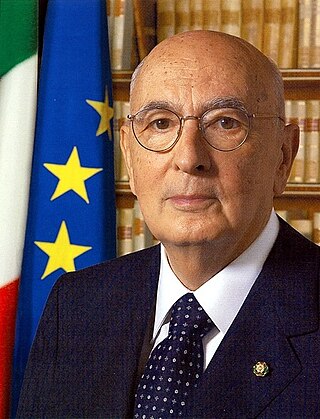
Giorgio Napolitano was an Italian politician who served as the 11th President of Italy from 2006 to 2015,the first to be re-elected to the office. In office for 8 years and 244 days,he was the longest-serving president,until the record was surpassed by Sergio Mattarella in 2023. He also was the longest-lived president in the history of the Italian Republic,which has been in existence since 1946. Although he was a prominent figure of the First Italian Republic,he did not take part in the Constituent Assembly of Italy that drafted the Italian constitution;he is considered one of the symbols of the Second Italian Republic,which came about after the Tangentopoli scandal of the 1990s. Due to his dominant position in Italian politics,some critics have sometimes referred to him as Re Giorgio.

The People of Freedom was a centre-right political party in Italy. The PdL launched by Silvio Berlusconi as an electoral list,including Forza Italia and National Alliance,on 27 February for the 2008 Italian general election. The list was later transformed into a party during a party congress on 27–29 March 2009. The party's leading members included Angelino Alfano,Renato Schifani,Renato Brunetta,Roberto Formigoni,Maurizio Sacconi,Maurizio Gasparri,Mariastella Gelmini,Antonio Martino,Giancarlo Galan,Maurizio Lupi,Gaetano Quagliariello,Daniela Santanchè,Sandro Bondi,and Raffaele Fitto.

The Monti government was the sixty-first government of Italy and was announced on 16 November 2011. This Experts' cabinet was composed of independents,three of whom were women and was formed as an interim government. The government ran the country for eighteen months until the aftermath of the elections in Spring 2013 and then replaced by the Letta government,formed by Enrico Letta on 28 April.
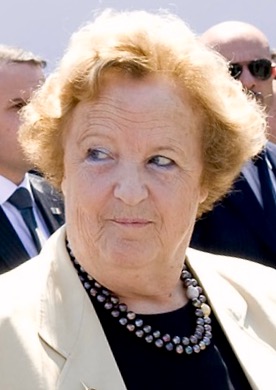
Annamaria Cancellieri is an Italian official and prefect who served as Minister of Interior in the Monti Cabinet and Minister of Justice in the Letta Cabinet.

Paola Severino is an Italian lawyer,academic and politician.

Renato Balduzzi is an Italian academic and politician. He served as the Italian minister of health under Prime Minister Mario Monti from November 2011 to April 2013.

Elsa Fornero is an Italian economist,university lecturer,and politician who served as Minister of Labour and Social Policies in the Monti Cabinet from November 2011 to April 2013.
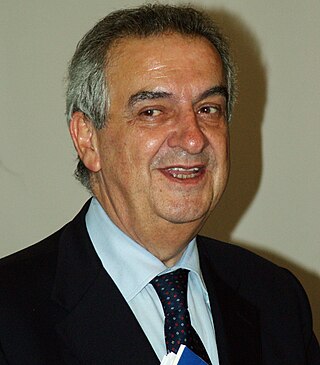
Lorenzo Ornaghi is an academic who served as the minister of culture in Monti cabinet
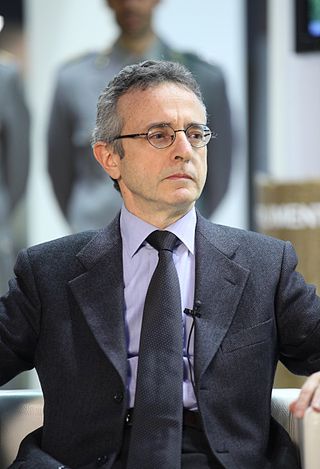
Mario Catania served as the Italian minister of agriculture under Prime Minister Mario Monti from November 2011 to April 28,2013.

The 2013 Italian general election was held on 24 and 25 February 2013 to determine the 630 members of the Chamber of Deputies and the 315 elective members of the Senate of the Republic for the 17th Italian Parliament. The centre-left alliance Italy Common Good,led by the Democratic Party (PD),obtained a clear majority of seats in the Chamber of Deputies thanks to a majority bonus that effectively trebled the number of seats assigned to the winning force and narrowly defeated the centre-right alliance of former Prime Minister Silvio Berlusconi in the popular vote. Close behind,the new anti-establishment Five Star Movement of comedian Beppe Grillo became the third force,well ahead of the centrist coalition of outgoing Prime Minister Mario Monti. In the Senate,no political group or party won an outright majority,resulting in a hung parliament.

Enzo Moavero Milanesi is an Italian independent politician and law professor who served as Minister of Foreign Affairs in the first Cabinet of Giuseppe Conte from 1 June 2018 to 5 September 2019. He was also the Chairman-in-Office of the Organization for Security and Co-operation in Europe during the Italian Chairmanship of the organisation in 2018. He previously served as Deputy Secretary-General of the European Commission (2002–2005) and as Italy's Minister of European Affairs in the Monti Cabinet and the Letta Cabinet from 16 November 2011 to 22 February 2014. He is a graduate of the College of Europe.

Vittorio Grilli is an Italian economist and academic. He was Italy's minister of economy and finance from 2012 to 2013 as part of the Monti cabinet.

Fabrizio Saccomanni was an Italian economist,civil servant and the director general of the Bank of Italy. He served as minister of economy and finance between April 2013 and February 2014. From 13 April 2018 until his death,Saccomanni was the chairman of UniCredit.

Beatrice Lorenzin is an Italian politician belonging to the Democratic Party,former leader of Popular Alternative,and former Minister of Health from 28 April 2013 to 1 June 2018,in the governments of Enrico Letta,Matteo Renzi and Paolo Gentiloni. In 2018 she became one of the longest-serving health minister in the history of the Italian Republic.
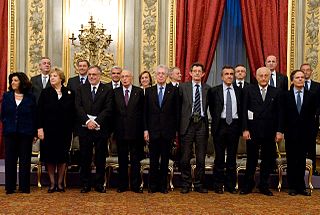
In Italy,a technocratic government,technical government or government of technicians,is the term used to refer to a cabinet made up of experts not officially affiliated to any political party or political coalition. Technocracy in Italy,as elsewhere,has often proved to be controversial. These governments tend to be formed during emergencies,usually an economic crisis,and are seen by some as undemocratic. There have been two such governments in the history of Italy:the Dini Cabinet,and the Monti Cabinet.

Francesco Boccia is an Italian academic and politician of the Democratic Party (PD) who served as Minister of Regional Affairs and Autonomies in the government of Prime Minister Giuseppe Conte.

In the Italian government,ministers without portfolio are nominated by the President of the Council of Ministers and formally appointed by the President of the Republic to lead particular departments directly under the Presidency of the Council of Ministers. Unlike the office of State Undersecretary to the Presidency,who fulfils duties in the Prime Minister's remit,ministers without portfolio enjoy the full status of ministers but do not lead an independent ministry. Departments on equalities,European affairs,and relations with regions,for example,are usually led by ministers without portfolio.




















